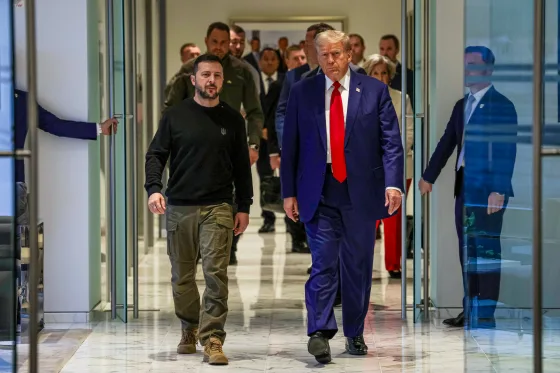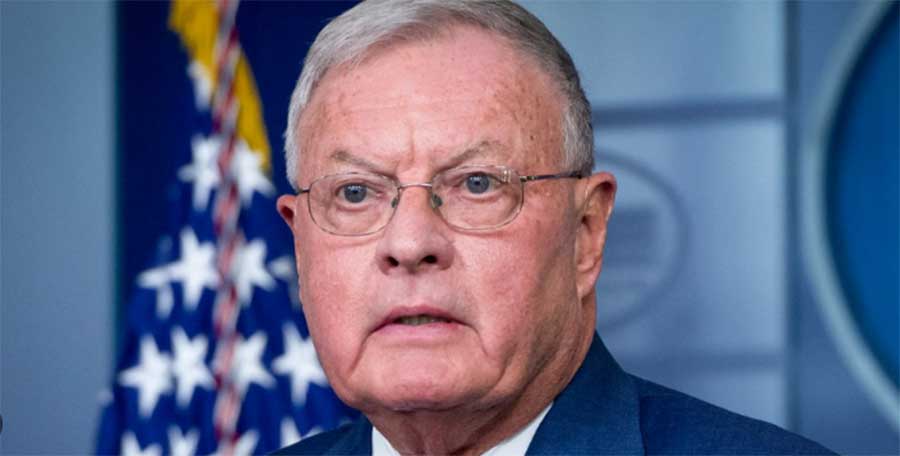Trump Nominates Gen. Keith Kellogg as Special Envoy to Russia and Ukraine
President-elect Donald Trump announced Wednesday that he will nominate retired General Keith Kellogg as his assistant and special envoy for Ukraine and Russia.
In a statement, Trump praised Kellogg’s distinguished career in both the military and business, noting that he served in critical national security roles during Trump’s first administration. “Keith has been with me from the beginning,” Trump said. “Together, we will secure peace through strength and make America—and the world—safe again.”
Kellogg served as the Chief of Staff and executive secretary to the National Security Council during Trump’s first term. He also has over 35 years of military experience.
In April, Kellogg co-authored a policy paper on ending the war in Ukraine, a document later obtained by NBC News. The paper outlined a plan to condition U.S. military aid to Ukraine on their participation in peace talks with Russia.
The proposal called for a ceasefire and a formal U.S. policy aimed at seeking a negotiated settlement to the conflict. Kellogg and co-author Fred Fleitz suggested that while the U.S. should continue to arm Ukraine to strengthen its defense, future military aid would depend on Ukraine’s willingness to engage in peace talks with Russia.
The authors also acknowledged that a resolution to the war may not be possible as long as Russian President Vladimir Putin remains in power. They noted that Ukraine would not be asked to give up its goal of reclaiming all its territory but would be encouraged to pursue diplomacy rather than military force.
“While a breakthrough may not come before Putin leaves office, Ukraine should aim for a diplomatic solution,” they wrote. They also recognized the difficulty of accepting a peace agreement that does not restore all of Ukraine’s territory or hold Russia accountable for the devastation caused by the war.
Asked about Kellogg’s position paper, Trump told NBC News, “I’m the only one who can get the war stopped. It should have never started in the first place.” Trump also expressed that European nations should contribute more aid to the cause.
Throughout his campaign, Trump has promised to end the war in Ukraine, though he has been vague on how he would do so. In a meeting with Ukrainian President Volodymyr Zelenskyy in September, Trump said, “We’re going to work very much with both parties to try and get this settled and worked out. It has to end. At some point, it has to end. His country has gone through hell.”
Trump has been critical of U.S. aid to Ukraine, claiming that every time Zelenskyy visits the U.S., he secures substantial financial support. “I’ll get it done. I’ll get it negotiated,” Trump said during a campaign event in Georgia.

Trump’s relationship with Zelenskyy has been complicated. A phone call between the two leaders in July 2019 resulted in Trump’s first impeachment. He was accused of withholding aid to pressure Zelenskyy into investigating Joe Biden and his son, Hunter Biden. Trump denied wrongdoing and was acquitted in the Republican-led Senate.
Vice president-elect JD Vance and Robert F. Kennedy Jr., Trump’s pick for Secretary of Health and Human Services, have also voiced opposition to Ukraine aid. At a Trump rally in September, Kennedy criticized the large sums of money the U.S. has sent to Ukraine, stating, “We need to bring that money home.”
Vance, in a “Meet the Press” interview, also endorsed peace talks as essential to ending the war. “At some level, we’re going to have to engage in some sort of negotiation between Ukraine, Russia, and our NATO allies in Europe,” he said.
This article was rewritten by JournosNews.com based on verified reporting from trusted sources. The content has been independently reviewed, fact-checked, and edited for accuracy, neutrality, tone, and global readability in accordance with Google News and AdSense standards.
All opinions, quotes, or statements from contributors, experts, or sourced organizations do not necessarily reflect the views of JournosNews.com. JournosNews.com maintains full editorial independence from any external funders, sponsors, or organizations.
Stay informed with JournosNews.com — your trusted source for verified global reporting and in-depth analysis. Follow us on Google News, BlueSky, and X for real-time updates.














